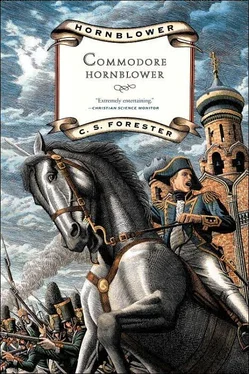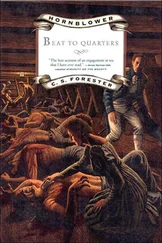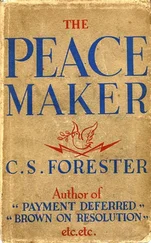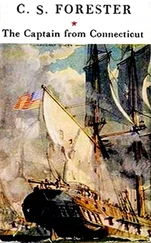“I am sending Diebitch out to beat up the besiegers’ lines with a sally,” Essen was saying. “I must see how they take this news. Would you care to accompany me, sir?”
“Of course,” said Hornblower, coming out abruptly from his dreaming. What with fatigue—he was always weary now—and rapid thinking and excitement he was still a little ‘mazy’, as they said of fuddled men in the village when he was a boy. He announced his departure to Bush.
“You’re worn out, sir,” protested Bush. “You’re no more than a shadow. Send someone else, sir. Send me. Send Duncan. You’ve done all that’s necessary, sir.”
“I haven’t yet,” said Hornblower, but he stooped so far as to risk delay by offering Essen refreshment, with the suggestion that they should drink a toast to celebrate this glorious news.
“Thank you, no,” said Essen, to Hornblower’s relief. “Diebitch will attack at dusk, and the days are short now.”
“You’ll take your barge, sir, won’t you?” persisted Bush. “Take Brown.”
Bush was like a fussy parent with a venturesome child—like a hen with one chick. He was always nervous about entrusting his precious Hornblower to these unpredictable Russians; Hornblower grinned at Bush’s solicitude.
“Anything to keep you happy,” he said.
Hornblower’s barge followed the Governor’s pulling-boat along the channel through the ice; Hornblower sat with the Governor in the stern of the Russian boat. There was a chill wind blowing, and the skies were grey.
“We shall have more snow,” said Essen, looking up at the clouds. “God help the French.”
In the absence of any sunshine there was a mortal chill in the air. Hornblower thought of the French marching over the desolate plains of Russia, and was sorry for them. And the snow came indeed, that afternoon, sweeping over river and village, making white innocuous mounds of the battered parapets and the shattered guns and the graves which were scattered through the village. It was already prematurely dark when the ever-patient Russian grenadiers lined the trenches and then sallied forth upon the enemy’s lines. They were not more than half-way across no-man’s-land before the guns began to fire upon them, stabbing the falling snow with their bright orange flashes.
“No sign of any retreat there,” was Clausewitz’s comment as he watched the fierce struggle from the gallery of the church beside Essen and Hornblower.
And if confirmation was needed the attacking party could supply it when it came drifting back in the darkness, decimated. The besiegers had met their sally with spirit; they had had patrols out in no-man’s-land, and the trenches were adequately guarded. In retaliation, the besiegers opened fire with their breaching batteries; the ground shook to the rumble of the discharges, and the black night was stabbed again by the flames of the guns. It was impossible to maintain good aim or elevation in the darkness; it was only a short time before the shots were flying wild, all over the village, so that the defenders as far back as the Dwina river had to keep low in their trenches. Shells were coming over, too, curving in high arcs from the mortar batteries which the besiegers had established in their second parallel. They fell and burst here, there, and everywhere, one every two or three minutes, in fountains of fragments and flame, save when chance guided them into deeper snow which extinguished the fuses.
“They have plenty of ammunition to waste,” grumbled Essen, shivering in his cloak.
“Perhaps they plan a counter-assault in the darkness,” said Clausewitz. “I have kept the trenches fully manned in case they try it.”
Immediately under Hornblower’s gaze there was a battery of four heavy pieces, firing regular salvoes at short intervals. He noted the four bursts of flame over and over again, so that when there was a longer interval he was surprised first by the absence of sound and then by its unexpected coming. The flashes endured their brief moment, to be succeeded again by night, but Hornblower found himself wondering what difference there had been between this salvo and the last, apart from the longer interval which had preceded it. One flash—the right-hand one—had not been as distinct as the other three, longer and yet intense. Some error in loading, perhaps. Then came the next salvo, and only three flashes; the right-hand gun had not fired. Maybe it had ‘unbushed’ itself—blown out its vent fitting, as guns sometimes did. Another long interval, and then another salvo—two sharp flashes, and one longer one. The next salvo only two guns fired, and Hornblower realized what had been going on. He plucked at Essen’s sleeve.
“They are destroying their guns over there,” he said. “They are firing some shots at us while at each salvo they fire a shot against the trunnions of one of the guns. There were four guns over there, Your Excellency. Now—see—there are only two.”
“Possibly,” admitted Essen, staring into the darkness.
“The firing is dying away,” agreed Clausewitz, “but perhaps they are only growing tired of wasting ammunition.”
There was only one flash from the battery next time, and there was something clearly odd about it.
“The last gun in the battery,” commented Essen. “Probably they burst it by overloading.”
He trained his telescope in the darkness.
“Look over there at their main camps,” he added. “Watch those fires. They seem to be burning brightly, but—”
Hornblower directed his gaze to the distant rows of camp-fires, sparkling very dimly in the thick night. He looked backwards and forwards along one of the rows, trying to keep track of them all. He thought he saw one fire wink and go out, but he could not be sure. His eyes were watering with the cold and with the strain, and as he rubbed them Essen shut his telescope with a snap.
“They are dying down,” he said. “I’m sure of it, and no troops would allow their camp-fires to die down on a night like this. Clausewitz, get your men ready to attack again. Diebitch—”
The Governor began rapping out orders. Hornblower had a momentary feeling of pity for the Russian soldiers, huddled in their freezing trenches, dispirited by their recent repulse and losses, now ordered to go out again to what would seem to them to be certain disaster in the night. The wind suddenly shrieked down upon them, piercing him to the bone, despite the cloak he clutched round himself.
“’Ere you are, sir,” said Brown’s voice unexpectedly in his ear. “I’ve brought you up a blanket. Let’s put it round you under your cloak. And ‘ere’s your gloves, sir.”
Deftly in the darkness Brown draped the blanket over him, so that his cloak held it down over his shoulders. It would look fantastic in daylight, but fortunately it was still dark. Hornblower was shivering, and he stamped his frozen feet in an endeavour to warm them.
“Aren’t those men of yours ever going to attack, Clausewitz?” grumbled Essen. “What’s the time? One o’clock? Send down to your brigadier and tell him I’ll have him cashiered if he does not pull his men together for an immediate advance.”
There was a long freezing interval, before the darkness before them was pricked by a few little pin-points of flame—musket-shots in the second parallel.
“Ha!” said Essen.
There was another long wait before the message came back. The sortie had found the advanced trenches abandoned save for a few posts. They were pushing forward now through the snow and the darkness towards the main camp.
“They’re going, then,” said Essen. “Have the cavalry paraded two hours before dawn. I’ll catch their rear-guard at daylight. I want all troops across the river then. And now a glass of tea, for the love of God.”
Читать дальше












